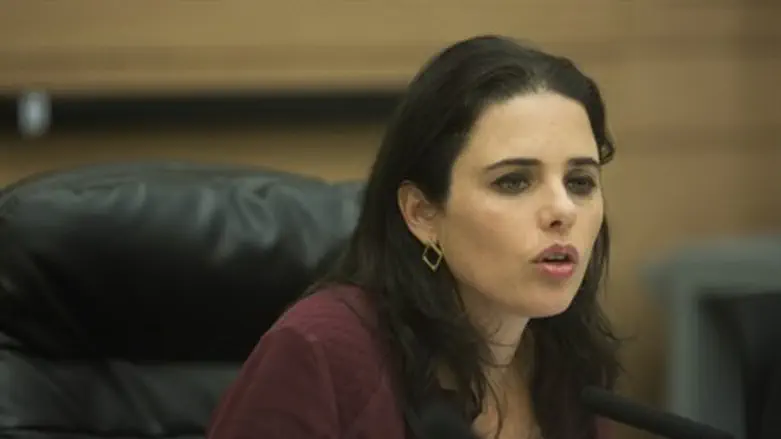
MK Ayelet Shaked (Jewish Home) said Monday that despite the postponement of the vote on the “terrorist pardon bill,” Prime Minister Binyamin Netanyahu intends to bring it for a vote in the diplomacy-security cabinet next week.
In a Channel 10 interview, Shaked also mentioned the Shamgar Committee on terrorist deals, whose recommendations would also be discussed in the upcoming debate, according to Netanyahu.
"We've been waiting for conclusions from the committee for a year and a half now,” she stated. “Netanyahu promised [Jewish Home head] Naftali Bennett that it will come up for a vote.”
The government had been expected to approve the law, which could prevent future mass releases of terrorists. Proposed by MK Shaked, it would allow a court to write into its sentence of a terrorist a clause that would prevent the President from signing off on his pardon in the future.
Netanyahu's decision to postpone the vote was reached following an opinion presented to the government by Attorney General Yehuda Weinstein, who is also the Government's Legal Advisor.
Bennett was reportedly enraged by the decision not to vote on the bill, and stormed out of the meeting after Netanyahu announced his decision. However, other reports said he was mollified when Netanyahu promised to bring the matter to the Diplomacy and Security Cabinet next week and promised to support the bill there.
Another reason for anger in Jewish Home is that there had been a deal between it and Yesh Atid, that the Jewish Home would allow a bill regarding the services of surrogate mothers for homosexual couples, and Yesh Atid would allow the terrorist pardon bill to pass in exchange. While the first bill passed, however, the second did not.
The Shamgar report was commissioned during the captivity of soldier Gilad Schalit in Gaza. Headed by retired Supreme Court President Meir Shamgar, the committee reached conclusions, but those conclusions were never made known to the public. It looked into how to conduct negotiations, and asked whether or not it was smart to even discuss the release of soldiers with terrorists. In addition, the committee's report discussed what Israel's “red lines” should be, and who should be in charge of negotiations over abducted Israelis, if they take place.
The report recommended, among other things, centralizing all the efforts to free soldiers under the authority of the Defense Minister, and to avoid using government-sponsored special negotiators to discuss matters with terrorists. In addition, the report suggests avoiding giving “updates” about the status of negotiations. “Secrecy is an important part of our recommendations,” the report says. “It is better to leave to guesswork information about the status of kidnapped or missing soldiers, and not provide that information to groups that will use it in improper ways.”